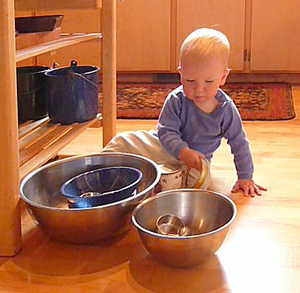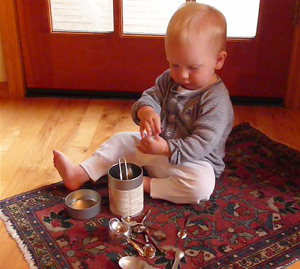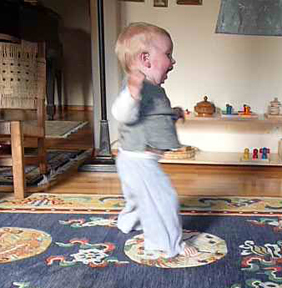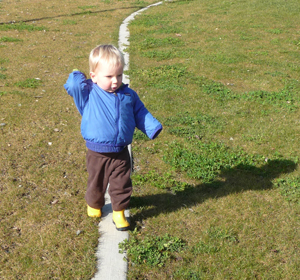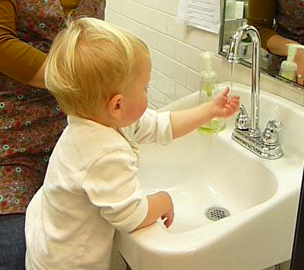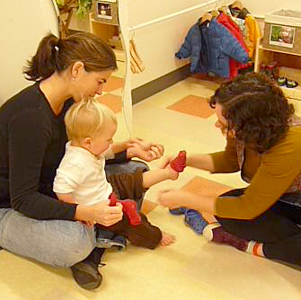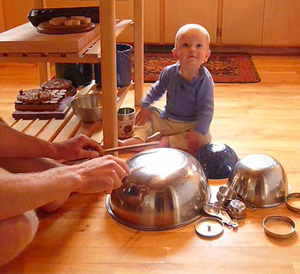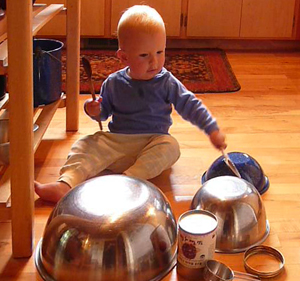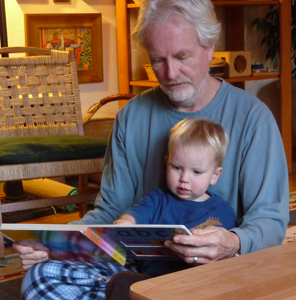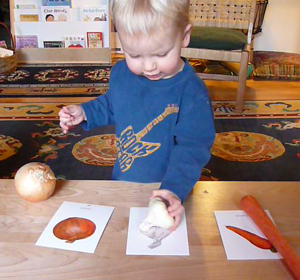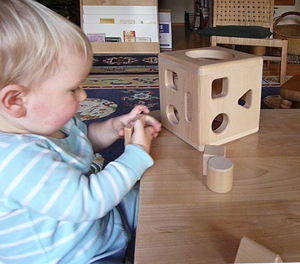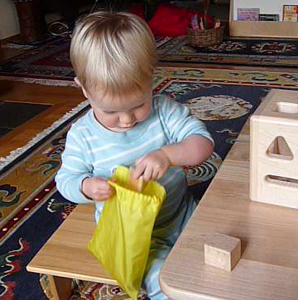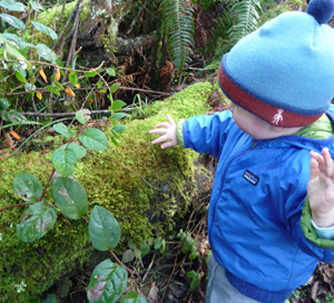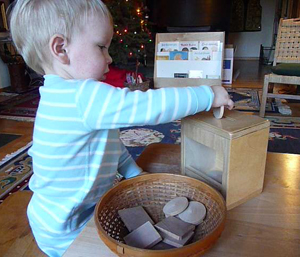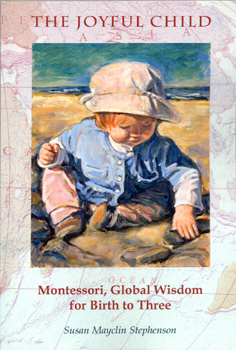Montessori Child Development Stages:
|
|||||
Age 0-3 home page: birth-three
Age 0-1 page: first year Age 1-2 page: second year Age 2-3 page: third year |
This site really is fantastic, I am going to mail it to everyone. Thank you! The first essential for the child's development is concentration. |
||||
NOTE After watching the videos on this page on the YouTube channel, you will be directed, by YouTube (trying to be helpful) to a random series of videos that have nothing to do with this site, and that we do not recommend, Filling a home with expensive toys is not necessary. Children want to carry out activities that they see the other family members doing. In the Montessori 0-3 infant community they see other children playing with the special early Montessori materials so they want to imitate, but in the home, the best thing parents can do is to make a space in every room of the home, a low and safe shelf and cupboard, and place everyday household items there. Then young children will feel like they are participating with the work of the family. |
|||||
|
|
||||
Many of the things a child needs to play with in order to develop can be found in the home, like these bowls placed on a low shelf that the child can get out at any time (and eventually learn to put back). It is important to provide CLEAN and SAFE space in the kitchen. Be sure that the child cannot get into drawers or cupboards that are not safe! 12 months. |
TRY TO AVOID INTERUPTING CONCENTRATION WHENEVER POSSIBLE! The inspiration to experiment, to concentrate, to use one hands and mind together working on the solving of a problem or mastering an activity, these lead to happiness and joy. Simple household items, if completely safe, can do just as well as any commercial toys. 12 months. |
||||
|
|
||||
The thrill of walking alone is unmatched in the development of the child. After months of pulling up, cruising sidewise while holding on to a bar or stool, "working" with toys on a low shelf while holding on with one hand, and practicing walking while holding on to the first walker wagon, finally the child can do it alone! 13 months. |
First a child learns to walk, then he begins to run everywhere. It is invalidating to keep telling a child "Don't run!," but providing a challenge of putting one foot in front of the other on a "line" seems to be an inborn tendency. It provides practice in balance, focus, and self-control, and is so much fun! 17 months. |
||||
|
|
||||
Every unnecessary help is a hindrance to the child's development. From the very beginning of life we watch for what a child can do, WANTS to do, for himself. Then we analyze the steps and teach him a bit at a time, following his interest. This is a teacher in a Montessori IC giving the first lesson on hand washing. 14 months. |
From early days children want to do what they see others do. Here the lesson is how to put on socks. But the child has other ideas. He wants to put "first shoes" or slippers on instead, and the specially trained teacher, or Assistant to Infancy, and his mother, are in touch with him enough to know just what he wants. He is so pleased to be understood. 14 months. |
||||
|
|
||||
Music is important to humans all throughout life. Wouldn't it be grand if each of us sang and danced and played music often? A child should learn that music comes from the movement of a human body, not from a CD player. In this video you will see how a period of "kitchen object" play turned into a drum lesson when the child was joined by his Afro-Cuban musician uncle. 12 months |
It is very clear that this young person has taken in and thoroughly enjoyed his "kitchen object" drum lessons. Now he is ready to solo! 12 months. |
||||
|
|
||||
Notice that this child repeats the ending words of the sentences read by his grandfather. This is a common stage in learning language. He is also learning to turn pages, and at the end of the book he says 'gen! which means "again" because children need repetition and will listen to the same book over and over until they have absorbed what they need from each reading. 17 months. |
First children learn the names of real objects in the home, especially important are those they encounter every day such as vegetables and fruit. Then, on the way to learning from pictures alone, we give them objects to match to the pictures. 17 months. |
||||
|
|
||||
When a child is growing up in an environment where his attempts to move, touch, explore, concentrate, are respected and not interrupted, he develops self-control and patience. This child is observing carefully, thinking, and trying to solve the puzzle, with no hint of frustration. 17 months. |
One never knows what part of a child's play or "work" will excite his interest, but it is always interesting at this age for a child to put items in a bag, or a box, or any container, and take the out again. 17 months. |
||||
|
|
||||
This child, on a nature walk with his mother, has experienced moss for the first time. He found, smelled, touched, many different patches. Learning a new word, such as "moss" is so much more meaningful when it is attached to a real objects and can be repeated over and over. 17 months. |
Handling mud, sand, water, is a delightful exploration for the young child. Stomping in puddles, squishing bud between one's toes or fingers and discovering it on the palms of the hands, are all parts of childhood that children need. it is very beginning of the understanding of matter, of physics. 17 months. |
||||
|
|
||||
Between the ages of 1 and 3 the development of the hand, eye-hand control, concentration span, thinking and planning, continue at a rapid rate. This child is putting round and square wooden discs in a wooden box with a slot at the top. The round discs can be held anyway and they go through the slot, but the square ones take a bit more thinking and handling, a further challenge. This child has mastered both. 17 months. MICHAEL OLAF Montessori information MICHAEL OLAF MICHAEL OLAF Montessori shop BOOKS & MATERIALS GENERAL MONTESSORI INFORMATION |
"FIRST MONTESSRI BOOKS" BOOKS Books in the "First Montessori Books" series that contain Birth to Three information: Aid to Life, Montessori Beyond the Classroom The Joyful Child: Montessori, Global Wisdom for Birth to Three AUTHOR'S WEBSITE, Montessori work over the years, art and international blog, SUSAN |
||||
SHARING THIS SITE: This site is being used in Montessori teacher training courses at all levels, and by schools to help parents discover the amazing potential of the young child, or to prepare families for future Montessori education. Please feel free to link it to any educational site and to share it. These developmental video clips and the accompanying information is being used all over the world, including the countries of Colombia, Peru, Mexico Russia, Japan, Indonesia, Turkey, Finland, France, Italy, Australia, Albania, Chile, South Africa, China, India, Pakistan, Ireland, Switzerland, Romania, and Canada and more. They are being shared by teachers, doulas, university professors, grandparents, artists, physicians and others. Updated on May 1, 2022 |
|||||
